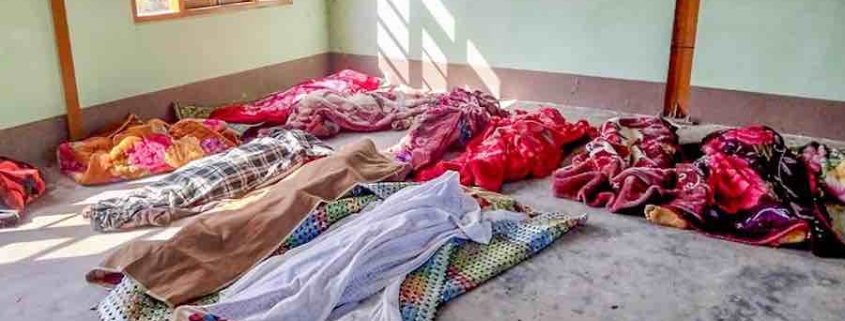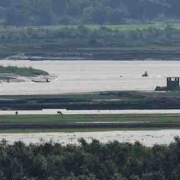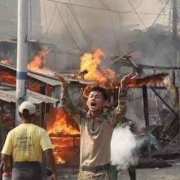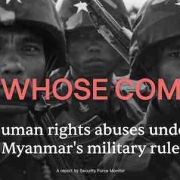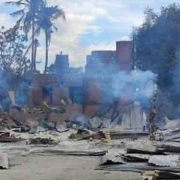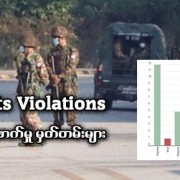Junta wields fear as a weapon with killing of civilians in Myanmar’s Sagaing
New data shows the military killed nearly 90 people in the region in the first quarter of 2024.
Junta troops arrested and killed nearly 90 civilians in northern Myanmar’s Sagaing region during the first quarter of 2024, according to data compiled by RFA Burmese, including several elderly villagers and others who were unable to flee military raids.
A stronghold of the rebellion, the Sagaing region has put up some of the stiffest resistance to junta rule since the military’s February 2021 coup d’etat, and has also endured some of the military’s most brutal atrocities during the country’s three years of ensuing civil war.
Observers told RFA that the military is attempting to create public animosity towards rebel forces in Sagaing, where its troops have suffered heavy losses in recent months.
Now, new data compiled by RFA shows that junta troops arrested and killed at least 86 civilians in nine Sagaing townships on the 101 days between Jan. 1 and April 10, or nearly one a day.

The townships of Kawlin, Shwebo and Taze suffered the highest number of casualties over the period, according to the data, which does not include civilians killed by fighting, airstrikes and heavy artillery.
In one of the latest incidents, a combined force of junta troops and pro-junta Pyu Saw Htee militiamen raided Shwebo’s Shar Taw village on the evening of April 6, arresting and executing nine civilians, residents told RFA.
‘They killed indiscriminately’
A woman from Shar Taw said she was irreparably traumatized by the capture and killing of the villagers as they fled indiscriminate shooting by junta forces.
“I was going crazy that day, darting through gunfire and shells with the children,” said the woman who, like others interviewed for this report, spoke on condition of anonymity due to security concerns. “At times, I’ve contemplated ending my own life. It feels like there’s no escape.”
The victims from Shar Taw included seven villagers aged between 50 and 90, and two people between the ages of 20 and 30, she said.

Two of the victims – both in their 80s – were burned to death in their homes and four others were shot dead in the village. The junta convoy detained a father and son, and a third man, and executed them after leaving Shar Taw.
The woman told RFA that the junta attacked her village entirely without prompting.
“Without doing anything to them, they make problems with us, killing people,” she said. “They killed indiscriminately, even those who have never seen a gun in their lives, those struggling to make ends meet, the mentally ill, and those who rely on their neighbors for support.”
Fear as a weapon
According to the list compiled by RFA of civilians arrested and killed in the first quarter of 2024, 22 people died in Kawlin, 19 in Shwebo, 14 in Taze, 10 in Monywa, seven in Khin-U, six in Kanbalu, five in Tabayin, two in Ye-U, and one in Kani. Three of the victims were women and the rest were men.
A member of the anti-junta People’s Defense Force, or PDF, in Shwebo told RFA that the junta is intentionally killing civilians in a bid to stir up public animosity towards the rebellion.
“We [rebels] are constantly on the move, mirroring their mobility, which leads to regular confrontations,” said the PDF member, who also declined to be named. “When the junta forces face defeat, they unleash their fury on civilian areas like villages, resorting to arson and destruction.”

Kyaw Win, executive director of Burma Human Rights Network, said he believes the military is also using fear as a weapon to fight back against an increasing number of rebel attacks on its forces – particularly in Sagaing and Magway regions.
“Sagaing and Magway are at the forefront of the resistance against the junta’s army,” he said, adding that the military’s “manpower is dwindling” after suffering “significant losses” in the two regions. “While setbacks have occurred elsewhere, these regions appear to be under intensified targeting. The brutality serves to instill fear and dissuade people from challenging their authority.”
Attempts by RFA to contact junta spokesperson Major General Zaw Min Tun and Nyunt Win Aung, the junta’s minister of social affairs and spokesperson for Sagaing region, regarding the arrest and killing of civilians, went unanswered Wednesday.
Legal experts and human rights activists have noted that the arrest and killing of civilians in conflict areas constitutes a grave offense punishable by death, as stipulated in both the Myanmar Armed Forces Act of 1959 and the Geneva Convention.

